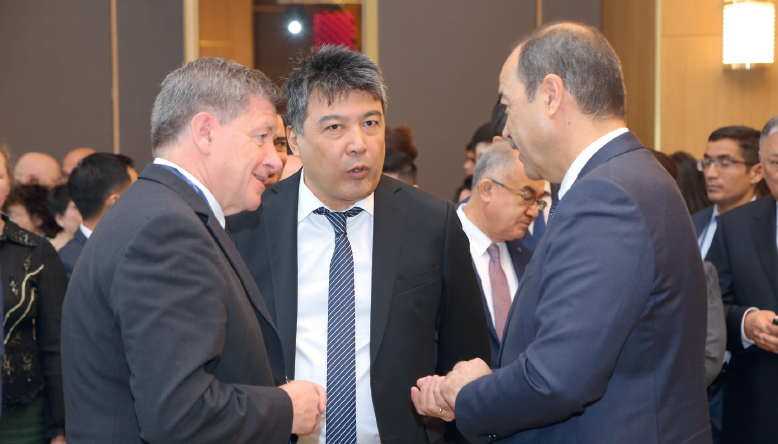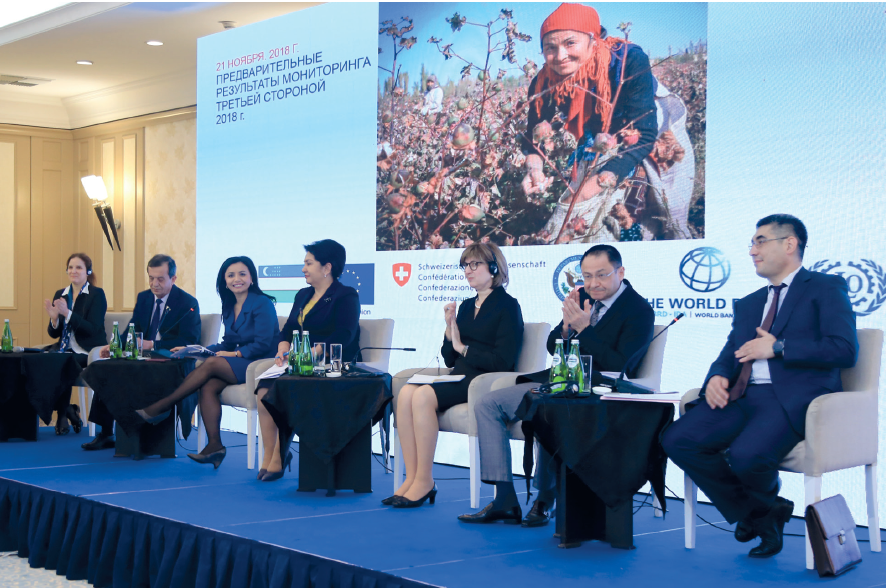Third party monitoring and feedback mechanism
Third Party Monitoring
The ILO has been monitoring child labor in the cotton picking process since 2013.
In 2018, as part of the Third Party Monitoring project, the ILO assisted the Ministry of Employment and Labor Relations in training more than 300 labor inspectors on indicators of child and forced labor, as well as inspection methods.
During the implementation of the project, more than 500 prosecutors, labor inspectors and trade union officials were trained in the methods of verifying the facts of forced labor and human trafficking. This training was organized by visiting a group of 15 people, consisting of representatives of various agencies of Uzbekistan, the ILO Training Center in Turin (Italy), with further replication of such training throughout the country with the help of those trained in the ILO Training Center as trainers.
In 2018, as part of the Third Party Monitoring project, the ILO conducted about 11,000 interviews with qualitative and quantitative data collection. More than 7,000 people were trained in fair hiring in the 2018 cotton-harvesting season. Since 2015, a feedback mechanism and third-party monitoring has been introduced in World Bank projects implemented in Uzbekistan.During the cotton campaign, ILO representatives are connected to a database that integrates citizens ’appeals received through the Telegram channel and a specially created communication channel. Today, civil society activists participate in monitoring along with ILO experts and are actively involved in governance processes.

As part of the ILO Third Party Monitoring project, more than 250 journalists were trained in international labor rights and journalistic investigations. Trainings were held in conjunction with Voice of America, Human Rights Watch, and the Development Strategy Center.
The ILO Third Party Monitoring project is constantly engaged with Cotton Campaign and other international organizations to ensure a balanced and neutral perspective on the situation in Uzbekistan.
With the assistance of the ILO Third Party Monitoring project, the US Department of Labor in September 2018 excluded Uzbek cotton from the list of goods produced using child labor, and the US State Department raised the level of Uzbekistan from the third category to the second category of countries.
Enhancing Collaboration
The visit of Mr. Guy Ryder, the Director-General of ILO was a historic event for Uzbekistan, during which promising areas of cooperation between the Republic of Uzbekistan and the International Labor Organization were discussed. During the negotiations, an agreement was reached on the development and adoption of a roadmap for long-term cooperation with the ILO, the continuation of work on the country’s ratification of the ILO conventions, in-service and pre-service training of specialists in the field of labor relations, support for the activities of trade unions and the confederation of employers. The Roadmap includes cooperation in such fields as:
••improving national legislation in the field of labor, employment and labor relations;
••improving national employment policies and enhancing the capacity of employment promotion services; enhanced international cooperation under the auspices of the ILO;
••increasing the representation of Uzbekistan in the executive bodies of the ILO;
••introducing a national system of appropriation and confirmation of qualifications, strengthening the quality of professional education programs;
••increasing the capacity of trade unions in organizing, collective bargaining, legal protection,
labor protection and safety. HUMAN VALUE OF LABOR | Progress log and a look into the future 2019.

Feedback mechanism
Since 2015 Feedback Mechanism project has been implemented at the initiative of the Steering Council on Child Labor in the Republic of Uzbekistan and with the support of the World Bank. As an instrument of public control, the FM is an alternative to State supervision in the field of
labor and is intended to supplement, not replace, it. Employees (citizens) and their communities are free to choose channels for managing appeals.
The goal of the Feedback Mechanism is to strengthen the results achieved and further prevent child and forced labor in the country, as well as to facilitate the ongoing Monitoring.
The activity of the Feedback Mechanism is regulated by the Regulation “On the Feedback Mechanism under the Steering Council for Child
Labor in the Republic of Uzbekistan”, approved at a meeting of the Steering Council (Minutes No. 5 dated 09/05/2015).
Since, initially, the FM operated on the basis of the trade union helplines at that time, and taking into account the need to accompany TPM, the regulation established the terms of operation of the Feedback Mechanism, covering the entire cotton harvest season of 2015, which includes the period from September 15 to 15 December 2015, i.e. additional 1.5-2 months after the expected end of the season. However, at present FM is functioning continuously – around the clock, 7 days a week.
The core of the Feedback Mechanism is the Call center, organized on the basis of the Legal Clinic of the Federation of Trade Unions. The equipping the Call center was carried out both at the expense of the Federation of Trade Unions’ own funds, as well as through the logistical assistance of the World Bank. To ensure free access to the Call center, two numbers – 2001092 and 1092 – were allocated, with direct and free access from all points of the country. The service charge is covered by the Federation of Trade Unions. Foreign calls are received by the same number after dialing the international code of Tashkent – “998 71 200 1092”.
The feedback mechanism structure consists of three levels:
National Administrative Center (NAC) – Legal Clinic under the Council of the Federation of Trade Unions (manages and coordinates the FM, ensures registration, direction and consideration of received appeals, conducts a weekly analysis of the consideration of appeals and summarizes the activities of the FM at the end of the season);
Regional administrative centers (RACs) in the Republic of Karakalpakstan, regions and the city of Tashkent are the legal departments of territorial associations of trade union organizations (they provide registration and consideration by the working groups of received appeals, inform the NAC about the outcome of the review).
The mechanism for review of appeals implies a phased study and an individual approach. Thus, the National Administrative Center sends the received appeal within 1 day to the corresponding regional administrative center. The regional administrative center organizes the review of the appeal with the involvement of members of the working groups and sends a certificate of the results of the review to the National Administrative Center.
The right of the Legal Clinic of the Federation of Trade Unions of Uzbekistan is not limited to reviewing applications received only from members of the trade union. To register and conduct ongoing analytical and statistical activities, autonomous software was developed on the portal of the Federation of Trade Unions of Uzbekistan at www.murojaat.kasaba.uz, with the ability to work online.
In case of revealing an administratively (or criminally) punishable offense, materials relating to this fact are sent to the authorized departments in order to bring the perpetrators to justice in accordance with the law.
Due to the separation of powers between departments, the Call Center under the Federation of Trade Unions of Uzbekistan and the Call Center under the Ministry of Employment and Labor Relations of Uzbekistan operate separately, as The Ministry of Employment and Labor Relations is authorized to exercise state supervision, while the Federation of Trade Unions exercises public control.
However, close cooperation was established between these agencies by exchanging information and assisting in the review.
Results of the FM in 2016
Based on the results of the analysis of activities in 2015, measures were taken aimed at improving the efficiency of the MoE in 2016. In particular, in order to ensure independence, the functions for the implementation of the FM were delegated to the Legal Clinic of the Federation of Trade Unions;
••12 regional branches of the Legal Clinic have been created, constantly functioning on the basis of territorial associations of trade unions;
••a stand-alone software was developed and implemented that operates online on the portal of the Federation of Trade Unions;
••in order to strengthen confidence in the FM, an appeals council has been created, composed of representatives of civil society institutions, authorized to make decisions on complaints regarding previously considered appeals;
••the mandatory review of anonymous appeals is established;
••it is forbidden to request written explanations and explanatory letters from the plaintiffs;
••a series of courses was conducted to increase the capacity of representatives of the network of legal clinics at the national and regional levels;
••to ensure effective interaction of similar preventive mechanisms, relevant Memorandums have been concluded with the Ministry of Employment and Labor Relations, the International Labor Organization (ILO) and the World Bank.
According to the results of 2016, a total of 6,112 appeals were received from the public through the channels of the FM.
FM results in 2017
In February 2017, the International Labor Organization reported that the Government of Uzbekistan was making progress in implementing reforms aimed at eliminating the risk of forced labor in the country's cotton sector. In the issued report on the results of independent monitoring of the cotton-picking campaign
of 2016, the ILO concludes that organized child labor does not exist.
Based on the results of activities in 2016, measures were taken aimed at improving the efficiency of the FM in 2017.
In particular,
••to raise awareness of citizens on national television, a video is shown on the feedback mechanism of trade unions with the “hot line” telephone numbers of the Federation of Trade Unions of Uzbekistan;
••mobile operators of the country have disseminated out SMS messages with information on what phone numbers should be dialed by citizens in case of detection of forced and child labor;
••With the support of the World Bank, a video was prepared on the Feedback Mechanism of the Federation of Trade Unions and the call center of the Ministry of Employment and Labor Relations, as well as a video on decent work in cotton growing;
••With the assistance of the ILO, a humorous feature video was produced on the benefits of official labor in agriculture for subsequent demonstration on local television channels;
••The preparation of a new generation of textbooks on labor law and international labor law has begun;
••the Decent Work Program in the Republic of Uzbekistan was extended for the period until 2020.
"The unacceptability of child labor is recognized by all walks of life: authorities, teachers, specialists, farmers, parents and the children themselves. Uzbekistan has stopped the practice of organized child labor"
As a result of the measures taken and improved confidence in the FM in 2017, 8 out of a total of 118 appeals regarding forced labor were anonymous, which is 7.84% (in 2016, 15 out of a total of 87 appeals were anonymous, which is 17.24% ).
The overwhelming majority of requests received during the cotton picking period were positively resolved – 1325 (69.7%), the arguments of 76 (4%) were not confirmed, and they were sent to authorized institutions – 102 (1.7%).
FM results in 2018
Based on the analysis of the effectiveness of the mechanism in previous years, measures were taken aimed at increasing the efficiency of the FM
in 2018. In particular,
First, offline software that operates online on the portal of the Federation of Trade Unions (www. murojaat.kasaba.uz) is updated, which allows registering all received appeals to trade unions and immediately send them for execution;
The second, in order to increase the capacities of specialists involved in the FM:
– a skills-improving course was held at the International training center in Turin (Italy) for some specialists (10 people) of Legal Clinics (February 26 – March 2, 2018);
– a training course on the identification and investigation of cases of forced labor and human trafficking was conducted for specialists from the FTU, CCI, the Ministry of Employment and Labor Relations, the General Prosecutor's Office, and the Ministry of the Interior at the International Training Center in Turin (Italy) (April 9-13, 2018. );
– regional training seminars were held jointly with the International Labor Organization (May 7-25, 2018 – all regions of the country); – A summer school was held for specialists of the FM FTU and CCI (August 9-10, 2018).
Third, a group was created in the Telegram network among FM specialists to quickly and immediately respond to incoming calls during the cotton-harvesting period.
Fourth, the practice of involving human rights activists was initiated.
For reference: in the cotton harvesting season of 2018, 53 reports on forced labor related violations were received from human rights activists, which were studied immediately with a field visit and all identified deficiencies were eliminated. Also, throughout the cotton harvesting season, the Open Doors Days for civil society representatives were organized at the Legal Clinic of the Federation of Trade Unions of Uzbekistan every Friday.
In 2018, 8,544 calls were received through the FM channels. In particular, 2,764 appeals, sent by persons who are not members of the trade union, were accepted and examined.
Human rights activist and International Human Rights Watch representative Steve Sverlow visited the Legal Clinic for a familiarization. Also, a meeting was organized with human rights activists such as Malokhat Eshonkulova, Uktam Pardaev, Azamjon Farmonov, Khaitboy Yakubov, Muhabbat Madrimova and Arslonboy Utepov.
Collaboration with Civil Society Activists
It is worth emphasizing that the modern Government of Uzbekistan, for the first time in its history, is in direct dialogue with representatives of civil society and human rights organizations on the protection of the labor rights of citizens.
Meetings with national human rights activists are held on a regular basis, an active dialogue is conducted, an exchange of views and information, as well as proposals to prevent forced labor.
In February 2019, an unprecedented meeting of the delegation of the Government of Uzbekistan with representatives of the Cotton Campaign international coalition took place.
The main purpose of the session within the annual meeting of the Coalition was to find mutually acceptable criteria, and so called “Threshold of progress”, at which one can judge the complete elimination of systematic forced labor, as well as the development of further mechanisms for interaction with the coalition aimed at abolishing of the so-called “boycott” in relation to textile products in Uzbekistan.
This step was positively assessed by both representatives of the Coalition and representatives of US ministries and departments as evidence of the readiness of the Government of Uzbekistan for an open dialogue and constructive interaction on the most sensitive human rights issues.









